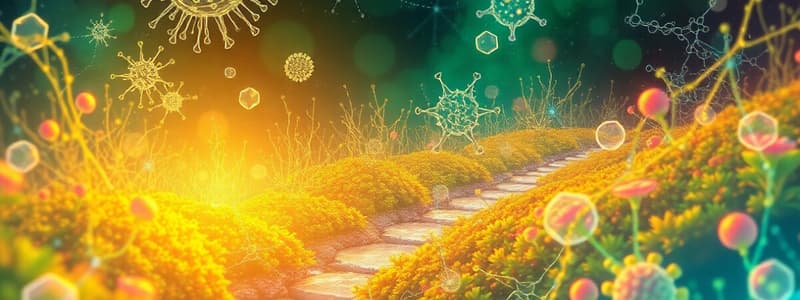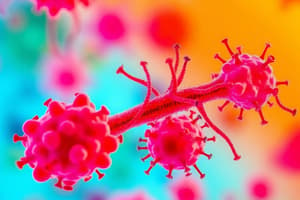Podcast
Questions and Answers
What is the primary focus of the course mentioned in the content?
What is the primary focus of the course mentioned in the content?
- Introduction to Biotechnology (correct)
- Introduction to Genetics
- Introduction to Environmental Science
- Introduction to Molecular Biology
Which semester is the course being offered?
Which semester is the course being offered?
- Fall Semester
- Winter Semester
- Spring Semester (correct)
- Summer Semester
Who is the instructor for the Biotechnology course?
Who is the instructor for the Biotechnology course?
- Dr. Sarah Lee
- Dr. Mohamed Salah Basiouny (correct)
- Dr. Maria Johnson
- Dr. Ali Ahmed
Which of the following is likely not related to the course content?
Which of the following is likely not related to the course content?
What is the correct email format for the instructor?
What is the correct email format for the instructor?
Which process involves using microorganisms to produce products beneficial to humans?
Which process involves using microorganisms to produce products beneficial to humans?
Which of the following is an example of a product derived from selective breeding?
Which of the following is an example of a product derived from selective breeding?
What is a common use of beneficial bacteria in medicine?
What is a common use of beneficial bacteria in medicine?
Cloning of plants and animals is primarily performed to achieve which outcome?
Cloning of plants and animals is primarily performed to achieve which outcome?
What is the primary benefit of using yeast in bread making?
What is the primary benefit of using yeast in bread making?
Who invented the compound light microscope?
Who invented the compound light microscope?
Which scientist is associated with the discovery of penicillin?
Which scientist is associated with the discovery of penicillin?
What significant contribution did Louis Pasteur make to science?
What significant contribution did Louis Pasteur make to science?
What did Antony van Leeuwenhoek first observe using his simple microscope?
What did Antony van Leeuwenhoek first observe using his simple microscope?
Which scientist is known for conducting genetics experiments using pea plants?
Which scientist is known for conducting genetics experiments using pea plants?
Which of the following subjects is essential for a career in the growing field mentioned?
Which of the following subjects is essential for a career in the growing field mentioned?
Why is broad training in various science courses important?
Why is broad training in various science courses important?
Which course is specifically mentioned as important for the field?
Which course is specifically mentioned as important for the field?
What will likely happen without a diverse background in sciences?
What will likely happen without a diverse background in sciences?
Which of the following is NOT listed as a necessary course for the mentioned career?
Which of the following is NOT listed as a necessary course for the mentioned career?
What is one of the applications of transgenic animals in biotechnology?
What is one of the applications of transgenic animals in biotechnology?
Which of the following represents a method used in basic research involving animals?
Which of the following represents a method used in basic research involving animals?
What is a key application of microbial biotechnology?
What is a key application of microbial biotechnology?
What is a significant benefit of animal cloning?
What is a significant benefit of animal cloning?
Which of the following is NOT a benefit of microbial biotechnology?
Which of the following is NOT a benefit of microbial biotechnology?
Why are animals considered important models in drug design and testing?
Why are animals considered important models in drug design and testing?
In what way does microbial biotechnology help in industrial waste management?
In what way does microbial biotechnology help in industrial waste management?
Which of the following is a characteristic of foods with higher protein content?
Which of the following is a characteristic of foods with higher protein content?
Microbial biotechnology primarily manipulates which organisms?
Microbial biotechnology primarily manipulates which organisms?
Which process is enhanced through the use of microbial biotechnology?
Which process is enhanced through the use of microbial biotechnology?
Flashcards
Biotechnology
Biotechnology
The use of living organisms or their components to develop or make products, or to improve plants or animals.
Biotechnology
Biotechnology
Using living things or their parts to create useful products or solve problems.
Introduction
Introduction
First part of the course or a lecture.
Fermentation
Fermentation
Signup and view all the flashcards
Dr. Mohamed Salah Basiouny
Dr. Mohamed Salah Basiouny
Signup and view all the flashcards
Selective Breeding
Selective Breeding
Signup and view all the flashcards
Spring Semester
Spring Semester
Signup and view all the flashcards
Antibiotics
Antibiotics
Signup and view all the flashcards
Yeast
Yeast
Signup and view all the flashcards
2024-2025
2024-2025
Signup and view all the flashcards
Cloning
Cloning
Signup and view all the flashcards
Mail Address
Mail Address
Signup and view all the flashcards
Office No
Office No
Signup and view all the flashcards
Phone Number
Phone Number
Signup and view all the flashcards
Microbial Biotechnology
Microbial Biotechnology
Signup and view all the flashcards
Better Enzymes
Better Enzymes
Signup and view all the flashcards
Industrial Waste Removal
Industrial Waste Removal
Signup and view all the flashcards
Important Proteins
Important Proteins
Signup and view all the flashcards
Science Courses
Science Courses
Signup and view all the flashcards
Biology
Biology
Signup and view all the flashcards
Computer Science
Computer Science
Signup and view all the flashcards
Chemistry
Chemistry
Signup and view all the flashcards
Math (Statistics)
Math (Statistics)
Signup and view all the flashcards
Broad Training
Broad Training
Signup and view all the flashcards
Leeuwenhoek's discovery
Leeuwenhoek's discovery
Signup and view all the flashcards
Hooke's invention
Hooke's invention
Signup and view all the flashcards
Pasteur's contributions
Pasteur's contributions
Signup and view all the flashcards
Ruska's invention
Ruska's invention
Signup and view all the flashcards
Fleming's discovery
Fleming's discovery
Signup and view all the flashcards
Mendel's work
Mendel's work
Signup and view all the flashcards
Plant-based drugs
Plant-based drugs
Signup and view all the flashcards
Animal protein sources
Animal protein sources
Signup and view all the flashcards
Transgenic animals
Transgenic animals
Signup and view all the flashcards
Animal research models
Animal research models
Signup and view all the flashcards
Gene knockout
Gene knockout
Signup and view all the flashcards
Animal cloning
Animal cloning
Signup and view all the flashcards
Organ transplants from animals
Organ transplants from animals
Signup and view all the flashcards
Study Notes
Introduction to Biotechnology
- Definition: Biotechnology is the manipulation of living organisms and organic material to serve human needs.
- Methods: Uses scientific methods with organisms to produce new products or forms.
- Goal: Using living organisms or their products to benefit humans and solve problems.
Types of Biotechnology
- Microbial Biotechnology: Manipulates microorganisms (like yeast and bacteria) to create better enzymes and more efficient waste removal processes, and to produce important proteins for medicine.
- Agricultural Biotechnology: Aims to increase food production by creating environmentally friendly plants with higher yields, resistance to diseases and insects, and improved vitamin/protein content. The UN predicts a substantial increase in food needed by 2050.
- Animal Biotechnology: Uses animals to produce medically valuable proteins like antibodies. Also uses animals as models for research, including gene knockout experiments and testing of drugs and genetic therapies. Animals can also be used as a source of transplant organs.
Historical Examples of Biotechnology
- Fermentation: A historical biotechnological process
- Selective Breeding: A historical process of modifying organisms
- Antibiotics: The historic use of beneficial bacteria to kill harmful organisms.
- Yeast in bread/alcohol production: Using yeast to produce bread and alcohol.
- Beneficial bacteria for killing harmful organisms: Using beneficial bacteria (like in penicillin) to kill harmful organisms.
- Cloning of plants and animals: Reproducing plants and animals.
- Artificial insemination: A technique in animal reproduction
Additional Examples of Biotechnology
- Increasing crop productivity: Increasing crop yields.
- Producing insulin: Bacteria used to produce insulin for treating diabetes.
- Oil spill cleanup: Modified bacteria to dissolve oil spills in marine environments.
Scientists and Their Contributions
- Antony van Leeuwenhoek: Discovered cells using a simple microscope (bacteria, protists, red blood cells)
- Robert Hooke: Invented the compound light microscope and observed cells in cork.
- Louis Pasteur: Defined bacterial role in spoilage and fermentation, and created the rabies vaccine.
- Ernst Ruska: Invented the electron microscope
- Sir Alexander Fleming: Discovered penicillin
- Gregor Mendel: Discovered genetics, conducted early experiments using pea plants.
Biotechnology Objectives
- Define and understand the scientific disciplines involved in biotechnology.
- Example applications of biotechnology (historical and modern)
- Types of biotechnology
- Potential advances in biotechnology
- How medical diagnosis changes due to biotechnology
- Data from the Human Genome project use for diagnosis/treatment
- Identify pros/cons of biotechnology and controversial topics
- Define career categories in biotechnology
- Define skills and training needed for biotech workforce
- Discuss hiring trends in the biotechnology industry.
Application Areas in Biotechnology
- Detailed description of application areas of Biotechnology (e.g. health, medicine, environmental, agriculture, etc.)
Course Specifications
The course involves 2 theoretical credit hours.
Additional Information
- A detailed study guide on the nature of the concepts is required and suggested to be prepared separately in relation to any specific learning objectives..
Studying That Suits You
Use AI to generate personalized quizzes and flashcards to suit your learning preferences.




